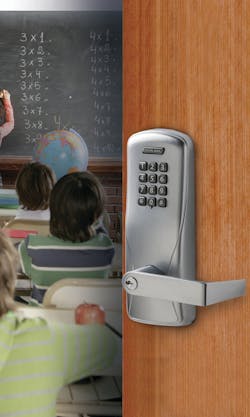Allegion Warns Against Quick-Fix School Lockdown Practices
Allegion PLC is celebrating this year's Safe School Week (October 19-25) by encouraging its security/architect partners and school end-users to be aware of new and untested security and lockdown products that could actually put staff and students at greater risk. It’s important for school administrators, emergency personnel and parents to know which campus security methods are effective and which should be avoided.
"Students and teachers are about 30,000 times more likely to experience a non-fatal violent assault or theft-related crime in school rather than a fatal active assailant,"* says April Dalton-Noblitt, director of vertical marketing, Allegion. "It’s important to protect students and staff from a violent intruder, but schools must also protect them from more likely causes of harm. These include student-on-student or student-on-teacher violence or uncontrolled access to property."
According to Dalton-Noblitt, security providers, school facility administrators and parents should avoid adopting products or practices that might actually put students and staff at greater risk of harm, including -
- Door hardware that forces an individual to step out of the room to lock the door, exposing that person to the intruder or conflict in the hallway.
- Hardware with “unrestricted ability” to lock or unlock the door. This lets anyone - including students - take control of an opening.
- Magnets or tape on the door to prevent latching. Not only is this a code violation if the door is fire-rated but, in lockdowns, one wants the door to latch without having to open the door first.
- School doors that don’t automatically close or can be left propped open, potentially preventing them from being in a ready position during an emergency lockdown.
- Security devices that are not permanently attached to the door, requiring staff to locate and attach the device in the midst of a lockdown emergency where seconds count and physical and emotional stress is extreme.
- Hardware that slows or prevents egress during an emergency situation.
- Devices which attach to the door closer arm to prevent the door from being opened. This is a violation of the egress codes.
- Floor bolts or other devices that obstruct the door and don't let it close.
- Anything that prohibits entrance or restricts the normal function of the door hardware by emergency responders.
- Any option that might be accessed or used by an unauthorized person acting with ill-intent. This could be a student, visitor or another staff member.
"Regardless of a school’s available budget, we want administrators to know that there are affordable, reliable safety measures that can be taken to minimize threats of violence," says Dalton-Noblitt. “For instance, the Schlage CO-220 lets teachers remotely lock down a classroom from anywhere in the room with the touch of a button. A built-in indicator lets a teacher or first responder easily see that the lock is engaged, without having to approach the door. And because the lockdown is triggered by a key fob the teacher wears on a necklace, there is no chance of a student getting unauthorized access and locking classmates inside the room.”
Through a free school security assessment, Allegion’s sales team can help school administrators find avenues to fund door hardware upgrades that will provide the right type of security for any school today. In addition to state and federal grants, many schools take advantage of the federal government’s Cooperative Purchasing program to secure discounted pricing and pre-vetted vendors. These options help schools make decisions that will enhance security and mitigate risk.
For more information or to schedule a free campus security site assessment, visit http://us.allegion.com/industries/education/Pages/default.aspx.
* National Center for Education Statistics, U.S. Department of Education, and Bureau of Justice Statistics, Office of Justice Programs, U.S. Department of Justice. Washington, DC; 2010.
Kwikset Kevo Upgrade Brings Free, Unlimited Guest eKeys
Kwikset® introduces its latest Kevo upgrade , giving users the ability to send free and unlimited Guest electronic keys (eKeys) to recipients, and with a Scheduled eKey, set day and time constraints for regular house guests like babysitters, dog-walkers and contractors. Kevo owners can update their Kevo mobile app and lock firmware to enable these new types of eKeys.
"We're always looking for ways to improve the Kevo experience, and we hope this upgrade shows our customers that we're listening," said Keith Brandon, director, residential access solutions. "Since Kevo's been on the market, our customers have asked for free eKeys that let them give access anytime to friends or neighbors without paying for a new key. Now our unlimited Guest eKeys let them do that. We're also introducing Scheduled eKeys to give homeowners the convenience of setting date and time constraints."
With new free and unlimited Guest eKeys, users can give recipients unrestricted access for a 24-hour period. Owners also have the option to delete Guest eKeys manually before the 24-hour access expires. The new Scheduled eKey enhances home access control by allowing users to set day and time constraints right from their phones. Ideal for house cleaners, dog walkers, nannies or others that need regular access at pre-determined times, like on Tuesdays and Thursdays from 1-3 p.m. Kevo owners can schedule these eKeys to be active prior to sending, so they don't have to remember to grant or revoke access to these users in real time.
"The Kevo technology platform was built with the future in mind by having the ability to add new features and enhancements to the firmware in the lock, in addition to the mobile app. This capability allows the lock to get smarter over time." said Phil Dumas, UniKey founder and president.
Managing eKeys using the Kevo mobile app is easy, letting owners control their home security at any time with their smartphones. Additional Kevo app features include:
- History log that monitors lock activity and tracks eKey users
- Optional push notifications when an eKey locks or unlocks the door
- Ability to share eKeys in just a few clicks
- Ability to temporarily disable or completely delete unwanted users from Kevo
- Touch-to-open convenience with authorized Kevo deadbolts
- Kevo web portal that offers the same management features via a web browser
Since its introduction as the first-to-market, Bluetooth® enabled smart lock in October 2013, Kevo has turned the smartphone into a key and revolutionized the way users share and manage access to their homes. The Bluetooth-enabled deadbolt offers the only touch-to-open technology that lets users unlock the door with a simple touch while their authorized smartphone remains in their purse or pocket.
Kevo comes with two eKeys that can be reassigned as Scheduled or Anytime eKeys as well as free, unlimited Guest eKeys. To grant long-term access to additional guests, Kevo owners can purchase additional Anytime or Scheduled eKeys in the app for $1.99.
To learn more about the Kevo mobile app update, visit www.kwikset.com
BHMA Publishes North American Product Category Rules
The Builders Hardware Manufacturers Association (BHMA) announces the publication of the complete North American Product Category Rules (PCR) for builders hardware. These rules were developed to assist manufacturers in the technical assessments necessary to produce environmental product declarations (EPDs).
BHMA initiated development of the PCR, marshaling the expertise of Underwriters Laboratories (UL) in the field of environmental impacts. The full BHMA Product Category Rules document is available to all manufacturers for download in the new sustainability section of the BHMA website, along with helpful definitions of basic terminology.
“Responding to a need for uniform requirements, BHMA also ensured that international PCR documents stand in alignment with our final PCR document," says BHMA Executive Director Ralph Vasami. “These Product Category Rules are the first industry-wide resource for hardware and demonstrates our industry’s commitment to constructing more environmentally conscious buildings in North America.”
The first Product Category Rules cover locks, latches, exit devices, door closers, hinges, and other associated products. BHMA’s PCR will facilitate the generation of analyses of a products’ environmental impact – a step that must be completed in preparation of EPDs while also streamlining comparisons of the completed EPDs across these product categories.
After several months of development, the PCR was posted for review on the UL Environment and GEDnet websites as part of its open consultation period. Upon consideration of comments additional revisions were incorporated and the document was finalized in late Spring 2014.
To learn more about BHMA’s Product Category Rules or view the full document, visit the website at http://buildershardware.com/bhma-pages/bhma-sustainability.
Kansas Schools Choose Everest 29™ Key System
The Olathe Public School District is improving classroom security and simplifying key control by replacing multiple brands of locks on classrooms and other doors with Schlage locks and a patent-protected Everest 29™ key system.
Previously, the district used key systems from three different manufacturers, which made key control difficult and compromised security. The problem was compounded when some systems were no longer supported by their manufacturers and others had reached their capacity, allowing no room for further expansion.
“Whenever a new school was built, it ended up with the lock system that was bid for that job and the different types on each building made it difficult to maintain effective key control," explains the district's lead carpenter and locksmith Tim Keyes. "Some of the key systems had been in place so long that it was difficult or impossible to know who had keys and maintenance also had become troublesome."
Faced with this situation and concerned about the rising trend in violent incidents in schools, Olathe instituted a proactive review of its options for protecting its students and staff. As a result, it is in the process of replacing locks with Schlage products and implementing a patent-protected Everest 29 key system.
Since the Everest 29 key system provides patent protection against unauthorized duplication through 2029, Keyes says that the district will be able to maintain effective key control with confidence. Another advantage of the new key system is that it is compatible with restricted Schlage Primus XP keys already being used in some applications. Keyes adds that the service he has received from Allegion on this and other products, including LCN door closers and Von Duprin exit devices, also was important in the consideration process.
According to Keyes, the Schlage L-Series mortise locks and ND-Series cylindrical locks used on Olathe schools include a classroom function that allows teachers to lock the door from within the classroom during an incident instead of being exposed to danger when locking a door in the hallway.
Currently, locks are being replaced in Olathe’s 34 elementary schools with its nine middle schools and, eventually, its four high schools to follow. Although most of the locks being upgraded are on classroom doors, the district also is replacing locks on other openings such as custodial and equipment closets. All locks are Schlage with full-size interchangeable cores, which simplify rekeying, Keyes points out.
The Olathe Public Schools USD 233 was formed in 1965 with the unification of five districts and now includes 52 schools and related learning centers. Today it is the second largest school district in Kansas, with an enrollment of more than 29,000 students and is expected to continue growing for the next 30 years.






